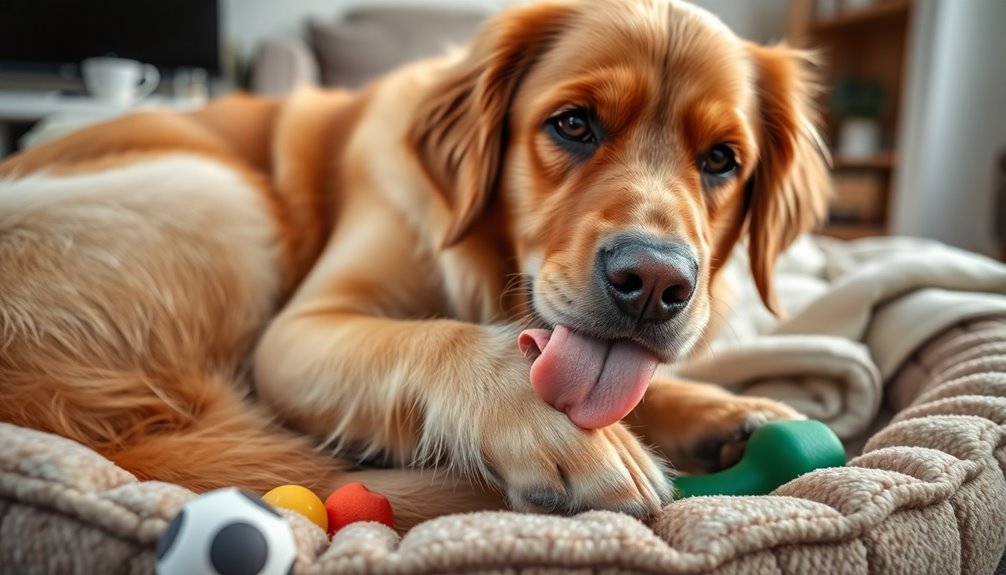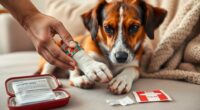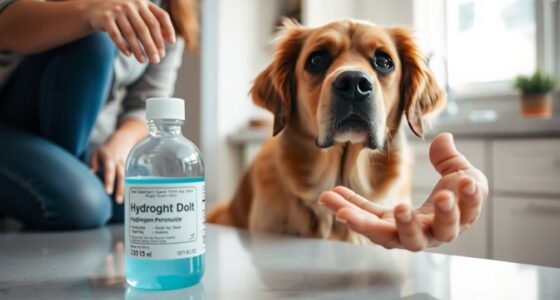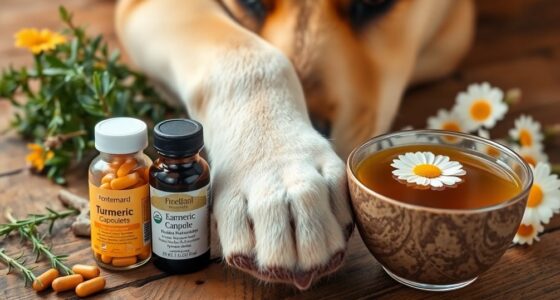If your dog's licking his paws, it could mean a few things. Allergies, infections, injuries, or parasites might be the culprits. Itching from allergens or discomfort from infections can lead to excessive licking. Sometimes, it's just boredom or anxiety. Keep an eye on his paws for redness or swelling, and consider a vet visit if it persists. Understanding the reasons behind his behavior can lead to effective treatments, so keep exploring the options available.
Key Takeaways
- Dogs may lick their paws due to environmental allergies, which can be managed with vet consultation and potential dietary changes.
- Bacterial or fungal infections can lead to paw licking; signs include discharge or odor, necessitating prompt veterinary care.
- Injuries such as cuts or foreign objects between toes can cause discomfort, requiring regular inspection and possible vet evaluation.
- Parasites like fleas and ticks irritate paws, making prevention essential through regular treatments and vet guidance.
- Behavioral issues like boredom or anxiety may drive excessive licking; increasing exercise and engaging activities can help alleviate these behaviors.
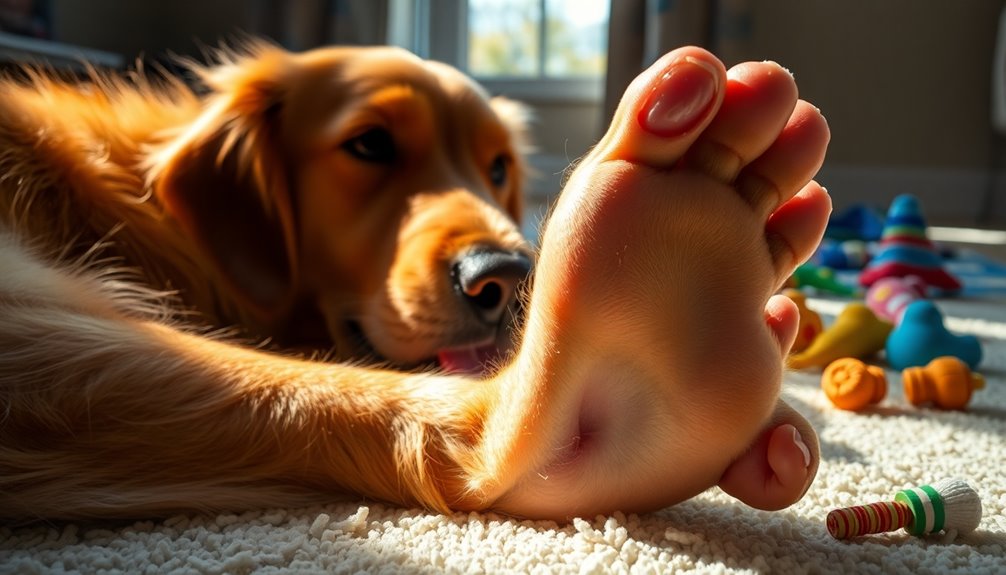
Have you noticed your dog licking his paws more than usual? While it's common for dogs to engage in a bit of self-grooming, excessive licking can signal underlying issues that need your attention. Understanding the common causes of this behavior will help you determine whether it's just a quirk or something that requires a visit to the vet.
One of the primary reasons for dog licking their paws is allergies. Just like humans, dogs can experience environmental allergies. If your dog's paws are itchy, he might be trying to relieve that discomfort by licking. Common allergens include pollen, dust mites, and mold.
Food sensitivities can also play a role in paw licking. If you suspect your dog may have allergies, it's essential to observe any other symptoms, such as redness, swelling, or irritation on the skin. If you notice these signs, it's a good idea to consult your vet, who may recommend allergy testing or a dietary change.
Infections of the skin are another reason your dog might be excessively licking his paws. Bacterial or fungal infections can cause significant discomfort, leading your dog to lick more aggressively. If you see any discharge or foul odor coming from the paws, it's crucial to seek veterinary care.
Infections can worsen if left untreated, so addressing them early can help your dog feel more comfortable and prevent further complications.
Sometimes, your dog's paw licking may stem from injuries. If he's got cuts, stings, or foreign objects lodged between his toes, he may react by licking the area to alleviate pain or discomfort. Keep an eye on his paws for any signs of injury, and if you find something, remove it carefully.
If the licking continues or the injury looks serious, a visit to the vet is necessary.
Parasites like fleas and ticks can also lead to itchy paws. These pests can cause significant irritation, prompting your dog to lick his paws to relieve that itching. Regular flea and tick prevention is key to keeping these parasites at bay.
If you notice your dog licking his paws and suspect parasites, talk to your vet about the best prevention methods.
Finally, behavioral factors may contribute to your dog's excessive licking. Boredom or anxiety can drive dogs to engage in repetitive behaviors like paw licking. If you think this might be the case, consider increasing your dog's exercise and playtime. Engaging activities can help alleviate boredom and reduce anxiety.
Frequently Asked Questions
How Do You Treat a Dog's Constant Licking Paws?
To treat your dog's constant paw licking, start by examining the paws for injuries, irritants, or foreign objects.
If you notice anything unusual, consult your veterinarian for a proper diagnosis.
You might need to use topical treatments like medicated sprays to soothe irritation.
Increase your dog's physical activity and provide engaging toys to distract them.
Regular grooming and moisturizing dry pads can also help prevent further licking behaviors.
What Can I Put on My Dog's Paws to Stop Him From Licking Them?
To stop your dog from licking his paws, consider using a bitter-tasting spray that's safe for his skin—it'll deter the behavior effectively.
You can also apply paw balms with natural ingredients like coconut oil to soothe any dryness.
Keeping his paws clean and dry is essential, so inspect and wash them regularly.
If necessary, try protective booties to prevent licking while offering comfort.
Always consult your vet for further advice if issues persist.
What Does Pododermatitis Look Like in Dogs?
Pododermatitis can look like your dog's paws are auditioning for a horror movie!
You'll notice redness, swelling, and irritation between the toes and pads. Excessive licking often leads to hair loss, crusty patches, or even oozing lesions.
If there's a foul odor, that's a sign of possible infection. Keeping an eye on these symptoms can help you catch the problem early, so don't hesitate to consult your vet for a proper diagnosis.
How Do I Treat My Dog's Irritated Paws?
To treat your dog's irritated paws, start by inspecting them for cuts or foreign objects. If you notice anything unusual, consult your vet.
You can use medicated soaks or sprays to reduce inflammation and fight infections. Applying coconut oil may soothe dry pads, but check with your vet first. Oatmeal baths can also help with itching.
Regular grooming and protective measures like dog boots can prevent further irritation and keep your dog's paws healthy.
Conclusion
If your dog's licking has you scratching your head, it's important to identify the root cause. Whether it's allergies, boredom, or anxiety, addressing the issue early can prevent it from snowballing into a bigger problem. Keep an eye on their behavior and consult your vet if needed. Remember, a happy dog means a happy home, so don't let it be a thorn in your side. With a little attention, you can help your furry friend feel their best!

